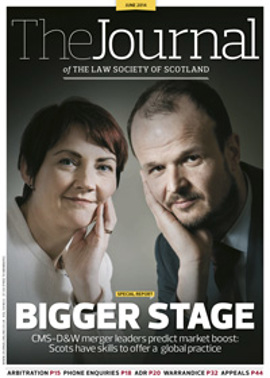Season of change

This summer sees a raft of changes to IP legislation, affecting patent, design and copyright protection.
The Intellectual Property Act 2014 obtained royal assent on 14 May. The Act, which comes into force from October 2014, with most measures being implemented in 2015, makes significant changes to design and patent protection. In addition, three new statutory instruments amending the copyright infringement exceptions came into force on 1 June.
Patent provisions
Key changes under the Act include:
- The Secretary of State is given power to implement the Unified Patent Court Agreement in the UK, establishing the EU Unitary Patent and the Unified Patent Court.
- Power is also given to designate UK courts as local divisions of the Unified Patent Court. The Court of Session will be so designated, if there is sufficient demand.
- Currently, patent owners mark patent-protected products with the patent number, to avoid infringers claiming they were unaware of the patent. In future, owners will have the option of marking products with a link to a website setting out this information.
- The Intellectual Property Office (“IPO”) will have the power to bring patent revocation proceedings of its own volition if the Patent Opinions Service (“POS”) considers that the patent is clearly invalid. At present, opinions are non-binding, so have no consequences for validity. This is a potentially troubling development for patent-holders, who will face the threat of revocation proceedings brought by the IPO for the first time. Currently, patents are only revoked if third parties raise revocation actions. The counter-argument is that it will make it easier for clearly invalid patents to be removed from the register.
Design amendments
The key changes to design law include:
- Criminal sanctions for intentional copying of registered designs in the course of business, bringing design protection in line with trademark and copyright protection. These will not apply to unregistered designs.
- The first owner of IP rights in commissioned UK designs will be the designer, rather than the commissioner, bringing design law into line with copyright and patent law.
- UK unregistered design right will no longer protect “any aspect” of a design. The likely effect of this is that very trivial features will be excluded from obtaining their own protection.
- There will be new defences to infringement of UK unregistered design rights relating to acts done privately, non-commercial experiments, and acts of reproduction for teaching purposes.
- Third parties acting in good faith will be able to continue to use a design which is subsequently registered by another party.
A Design Opinion Service, similar to the POS, will be introduced.
Copyright exceptions
Originally, the UK Government intended to bring five SIs into force on 1 June. However, the SI relating to the exception for “personal copies for private use” was withheld for further consideration, and the SI relating to the exception for “parody” and “quotation” was also withheld for further consideration of the meaning of “parody”.
Three regulations are still introduced. The changes contained in the Copyright and Rights in Performances (Research, Education, Libraries and Archives) Regulations 2014 include allowing sound, film and other broadcast recordings to be copied, to a fair and reasonable extent, without permission for private or non-commercial use by individuals, and by libraries and educational institutions. This will enable a more extensive range of materials to be made more easily available for use in teaching and research. Computer-based analysis of copyright material, for example text and data mining, will also be permitted, so long as it is for non-commercial purposes and carried out in accordance with the access provisions for the source material.
The Copyright and Rights in Performances (Disability) Regulations 2014 include changes which extend the scope of the current law so that any type of copyright work can be copied to permit a disabled person to access a work to which their impairment would otherwise prevent access. Copies can be made by the disabled person or by charities/educational establishments. The right will only apply where accessible copies are not already commercially available.
Lastly, the Copyright (Public Administration) Regulations 2014 will extend existing laws to enable public authorities to share some third party copyright material online where disclosure of the information is required to comply with their statutory obligations. Under the current law, the public body may only distribute paper copies or keep copies at its premises for public inspection. The broadening of this copyright exception fits nicely with the UK Government’s current Open Data initiative.
In this issue
- “It is a wise father...”
- Let the Games begin
- Power for change: EHRC's litigation strategy
- Framework for tribunal reform
- MIAMs: making meetings the end?
- Legal locksmiths: locking and unlocking charitable gifts and bequests
- Reading for pleasure
- Opinion: Marjory Blair and Kirsty Miguda
- Profile
- Book reviews
- President's column
- The big day unveiled
- Identity crisis?
- Arbitration: the way forward in disputes?
- A brand new framework
- Hello? Hello?
- A mediation story: The Mediator's Log
- ADR: Faculty makes its pitch
- Justifying extensions
- Season of change
- Beneficial changes
- Stormy waters
- Which way will it jump?
- People on the move
- Games-time goals
- Acceptance or warrandice?
- Getting ready for the "designated day"
- Turning concern into action
- Ask Ash
- Here comes 2012
- Ploughing a lone furrow
- Safety in networking
- Law: an insight job
- Sheriff decision causes power of attorney alert
- Law reform roundup
- "Find a registered paralegal"






